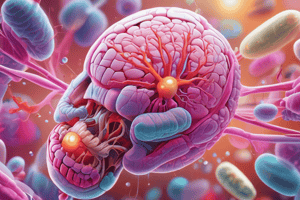Podcast
Questions and Answers
In which of the following scenarios is Therapeutic Drug Monitoring (TDM) unnecessary?
In which of the following scenarios is Therapeutic Drug Monitoring (TDM) unnecessary?
- The drug in question has a narrow therapeutic range (correct)
- Dosage need not be individualized
- Appropriate analytic techniques are available to determine the drug and metabolite levels
- Clinical outcome is unrelated either to dose or to plasma concentration
Under what condition is TDM considered useful?
Under what condition is TDM considered useful?
- A direct relationship exists between drug levels and effects (correct)
- Overdose symptoms are similar to the disease being treated
- The drug absorption varies with dose
- The pharmacological effects can be clinically quantified
What is a key factor that can affect unexpected serum drug concentrations?
What is a key factor that can affect unexpected serum drug concentrations?
- Genetic factors (correct)
- Direct relationship between drug levels and effects
- Large individual variability in steady state plasma concentration
- Drug with wide therapeutic range
Which factor is not listed as affecting unexpected serum concentrations of drugs?
Which factor is not listed as affecting unexpected serum concentrations of drugs?
What type of drugs are mentioned as not requiring TDM?
What type of drugs are mentioned as not requiring TDM?
Flashcards are hidden until you start studying
Study Notes
Therapeutic Drug Monitoring (TDM) Scenarios
- TDM is unnecessary when the drug has a wide therapeutic index, meaning the difference between effective and toxic doses is large.
- In situations where drugs are administered in consistent, stable doses, TDM may not be required.
Conditions for Useful TDM
- TDM is considered useful for drugs with a narrow therapeutic index, where small changes in dosage can lead to significant clinical consequences.
- High variability in patient response or metabolism can necessitate TDM to ensure therapeutic effectiveness and minimize toxicity.
Factors Affecting Serum Drug Concentrations
- Key factors affecting unexpected serum drug concentrations include interactions with other medications, variations in metabolism due to genetic factors, and changes in patient health status.
Non-Influencing Factors
- Certain factors are not considered significant in affecting unexpected serum concentrations of drugs; specific examples were not listed in the provided information.
Drugs Not Requiring TDM
- Drugs that are typically mentioned as not requiring TDM include those with established dosages and predictable pharmacokinetics, such as certain antibiotics and analgesics.
Studying That Suits You
Use AI to generate personalized quizzes and flashcards to suit your learning preferences.




